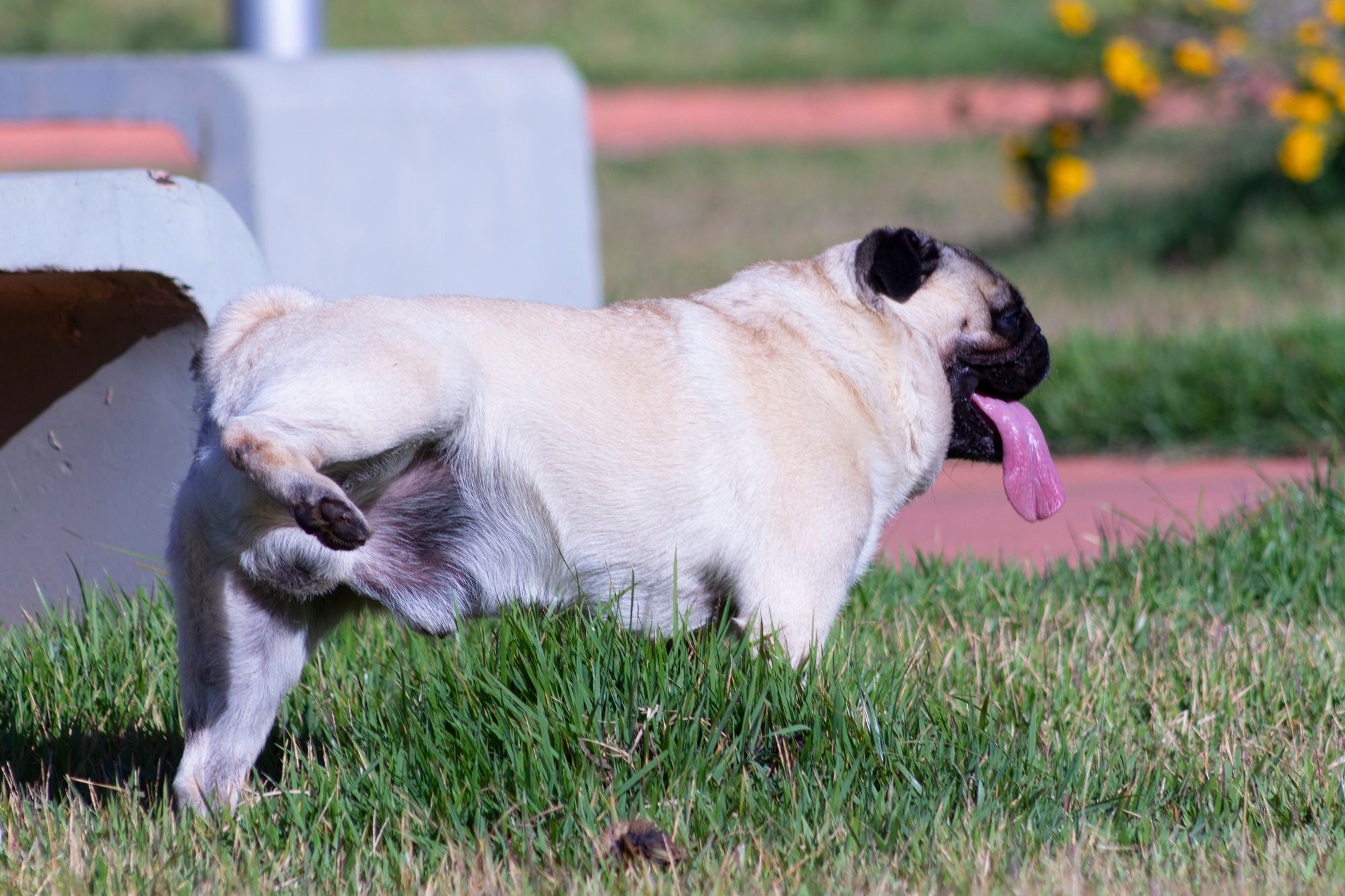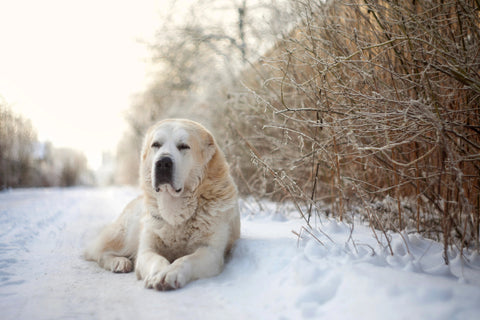You might be concerned about how long you have to leave your dog alone at home if you work long or irregular hours. How long can dogs hold their pee? Are you going to deal with accidents when you get home? And is determining the answer for how long can a dog go without peeing the same as how often they should be let outside?
In this article, we will determine how long can dogs hold their pee and talk about the most effective ways to help them deal with their bathroom breaks.

How Long Can Dogs Hold Their Pee?
Let’s get right to it, how long can a dog go without peeing? When we discuss how long our furbabies should be left alone at home, the issue of bathroom needs frequently comes up. Even though dogs can normally hold their bladders for long periods of time, it is crucial to acknowledge when that threshold is crossed.
A few things can affect how long dogs can hold their bladder:
- Age
- Size
- Health
- Diet
- Training
- Environment
AGE
The most common factor affecting how long your dog can hold its pee is their age. Puppies will not be able to hold their pee for as long as most adult dogs can, especially when the pups are not fully housebroken. Puppies have smaller, less developed bladders and urinary tracts which makes it harder for them to hold their pee. However, there is more to it than only the bladder capacity. It takes time for the muscle that contracts to hold and release the dog's bladder to develop. As a result, puppies require more frequent toilet breaks than adult dogs. Developing these muscles and training your furbaby to control their bladder are both important parts of potty training. So, be patient when potty training a puppy.
On the other hand, senior dogs may also begin to lose bladder muscle control as they continue to age. More frequent bathroom breaks and sometimes accidents can be because of muscle weakness, inflammation, mobility issues, and even kidney and liver dysfunctions.
So, how long can a dog go without peeing? Here is a brief guide to show you roughly how frequently your furbaby will need to pee depending on their age:
- Puppies below 6 months = 1 - 3 hours
- Puppies above 6 months = 2- 6 hours
- Adult dogs below 7 years = 6-8 hours
- Senior dogs above 7 years = 4-6 hours
- Senior dogs above 12 years = 2-4 hours
These figures are a nice place to start, but they are not the same for all dogs. As shown, adult dogs have the capacity to contain pee for long hours, but this does not imply that they should. In general, an adult dog has to be given at least 3-5 times each day to go potty at least once every 8 hours. And just like in humans, more frequent bathroom breaks are better to prevent discomfort.
DOG SIZE
How long can small dogs hold their pee? Is it different from large dogs? Another crucial aspect to help us determine how long can a dog hold their pee is their size. Compared to a larger dog, a small dog also has a small bladder. Although it does not always follow that all larger dogs can hold their pee longer, it may help with successful potty training and housetraining.
According to Pet Butler, it is estimated that your furbaby may pee between 10 and 20 ml per pound of their body weight.
"The most common factor affecting how long your dog can hold its pee is their age."
It is difficult to estimate how much volume a dog’s bladder will hold, however, it has been noted that smaller dogs' bladders are smaller in proportion to their overall body size than those of larger dog breeds. This implies that they will pee more frequently than larger dogs since their smaller bladders fill up more quickly.
Every dog is different, and this includes their potty habits, too. So, remember this is an approximation; your dog may do significantly better than or worse than these estimates.
OVERALL HEALTH
Frequent peeing by your furbaby may be from a variety of medical issues. Diabetes, kidney diseases, urinary tract problems, and even weight concerns might contribute. Medications also have an impact on how long dogs can hold their pee. Some prescriptions may have a diuretic effect, which urges peeing more frequently in dogs. On the other hand, some medications may also make your dog pee less regularly than usual.
Common health issues that affect a dog’s peeing schedule include:
- Weakening of the bladder muscles
- Urinary tract infections
- Mobility issues
- Kidney diseases
- Liver diseases
- Cancer
- Incontinence
It's crucial to consult your veterinarian if you are concerned that your pet is peeing more frequently than usual. It can be a sign of a medical problem.
ENVIRONMENT
Environmental factors can how long your dog is able to hold pee. Some dogs are not comfortable peeing in strange and new spots. Additionally, a dog is more likely to hold back peeing if they are stressed and anxious. Your dog may occasionally be in a stressful situations that cannot be avoided, such as traveling or moving into a new house. It is normal for your furbaby to hold their pee longer in these environments.
TRAINING

Determining how long a dog can hold their pee is also a question of training. One of the first chances pet parents have to truly work with their pets is house training. Unlike sit, shake, and stay, training your dog to hold their pee while they are inside your house to avoid accidents has its own distinct benefit for pet parents. But even though your furbaby has some extent of bladder control, potty training does not end there. Your dog will learn to hold their pee for a particular period of time depending on how frequently you take them out for potty breaks, especially when young.
Dogs with pet parents who are away for work and are unable to let them out more regularly will be better conditioned to hold their pee in other circumstances than dogs who are let out for potty breaks more frequently.
BUILD A POTTY ROUTINE
Adult dogs can sometimes hold their pee for up to 10 to 12 hours, if necessary. Most dogs can manage being left alone at home and keeping their pee for that long if the situation calls for it. But, regularly letting your dog hold their pee for too long increases the risk of certain issues including:
Urinary tract infections. Peeing flushes bacteria and toxins that are accumulated in the kidney, bladder, and urethra. When your dog holds their pee, the bacteria can spread throughout the urinary tract. This can result in the development of stones and blockages that can swiftly pose a threat to their health.
Urinary cancer. The more carcinogens that are present in your dog’s urine will come in contact with the bladder, the more chance they have to interact with cells.
Incontinence. Although it occurs more frequently in older dogs, incontinence can affect dogs at any age. When dogs hold their pee for too long, it is possible for the bladder to become too constricted, which can harm the muscle and surrounding tissues over time. Prevention is essential since incontinence may be irreversible. If your furbaby struggles with incontinence, you should use dog diapers or belly bands to prevent messes as they have no control over accidents.
Contact your veterinarian if your furbaby is having any problems peeing. Not peeing and holding pee for a long time, difficulty peeing, excessive peeing, leaking, and blood in their pee are all typical symptoms of a much larger problem.
Pee Pad Training Your Dog
Wether it is due to a medical reason, like incontinence, age, or for convenience in routine, you may consider letting your dog use a pee pad. If you are out of the house longer than the recommended amounts of time, you might use Pawtect® Pads to pee pad train your dog. These washable and reusable puppy pads come in a pack of two and are machine washable so that you can always have one ready to go.
Pee pad training is a great solution when you work long hours, have a senior dog that cannot hold their bladder the same, or if you are still developing a schedule for how long your dog can go without peeing. If your dog is not potty trained, you can opt to have them wear washable dog diapers or belly bands.
To help support a healthy bladder, give your dog Bladder SoftSupps®. These bladder supplements for dogs are made with Pacran®, the most scientifically proven cranberry product which promotes optimal bladder health. These dog bladder supplements are safe for all ages and sizes. Bladder SoftSupps® are also recommended for dogs who experience UTIs or bladder stones.
" If you are out of the house longer than the recommended amounts of time, you might use Pawtect® Pads to pee pad train your dog. "
How long can dogs hold their pee? All dogs are different. Some are able to hold their pee longer than others, but this varies depending on their age, size, health, environment, and training. Ideally, you should let your dogs out to pee at least every six to eight hours to avoid some urinary problems.









